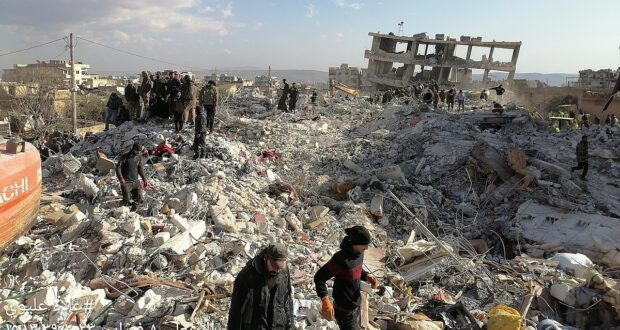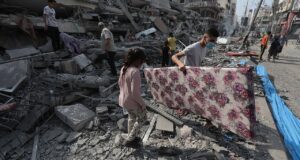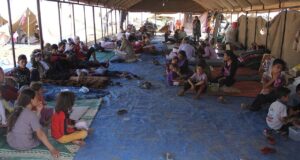23 June, 2023
Nawal Abdisamad, Research Assistant
The earthquake that took place in Syria and Turkey has been one of the most devastating in recent history, killing over 50,000 people, and destroying and damaging over 230,000 buildings. The Ukraine war has left over 9,000 civilians dead according to the Office of the United Nations High Commissioner for Human Rights. This article will focus on why there was a difference in response between these two events and why it is important to respond to any crisis or event based on humanitarian principles and the needs of those involved, rather than political or strategic considerations.
The earthquake took place on 6 February 2023, when a powerful earthquake struck the south-eastern region of Turkey and the north-western area of Syria, impacting the lives of millions of people. The horrific incident meant many were in desperate need of urgent assistance, aid, clean water, and emergency shelter and accommodation. With homes being broken down and wrecked, many people were ill-equipped to be exposed to the extremely cold weather. The situation in Syria was already critical for many people living there who were facing a food crisis, conflict, and lack of resources. This earthquake worsened it by leaving millions more in desperate need of aid. International Organisations like the United Nations and the World Health Organisation pulled together and facilitated rescue teams, food, water, blankets, medicine, etc. The World Health Organisation sent health supplies to help 400,000 people in desperate need. The United Nations World Food Programme also helped provide food to 1.7 million people.
The earthquake caused immense devastation in both countries, but Turkey has an advantage in this situation compared to Syria due to its well-established and efficient emergency response infrastructure and healthcare system. The situation in Syria was already dire before the earthquake, with millions of people relying on aid and assistance. Now they are facing a shelter crisis which if not tackled immediately will have severe consequences for their health, potentially leading to further loss of life.
Moving on, the Ukraine war is an ongoing conflict that began in 2014, following the Euromaidan protests and the ousting of Ukrainian President Viktor Yanukovych after he decided not to sign a planned Association Agreement with the European Union. The conflict began when Russian-backed separatists in the eastern regions of Donetsk and Luhansk declared independence from Ukraine, leading to a military conflict between Ukrainian government forces and separatist rebels. In parallel, Russian forces seized control of the Crimean Peninsula. The situation is complex and involves a range of political, economic, and strategic factors, including tensions between Ukraine and Russia, the role of separatist groups, and the involvement of other countries and international organisations. Russia has been accused of providing military and financial support to the separatists, although Moscow denied these allegations.
Russia launched a military operation in Ukraine, on February 2022, with forces travelling into the country from Belarus, Russia, and Crimea. President Putin said that it was a “special military operation” with the goal of protecting the people of the Donbas and de-escalating and demilitarising Ukraine. Putin denied any motive to occupy Ukrainian territory or press anything by force. This is in direct contrast to what has been happening over the last 17 months with Russian forces conducting a full-scale assault on Ukraine. Despite not having full control over the regions, Russia signed annexation treaties in October 2022, recognizing Donetsk, Luhansk, Kherson, and Zaporizhzhia as part of the Russian Federation. Ukraine, with the help of Western military assistance, has been directing a significant counteroffensive and succeeding in making territorial gains. Both Russia and Ukraine are now engaged in new spring offensives, with Ukraine determined to regain all its sovereign territory, including Crimea, which was annexed by Russia in 2014. The Kremlin has stated that the annexed regions will remain with Russia forever. As a consequence, the conflict has resulted in thousands of deaths, widespread displacement, and humanitarian crises. Efforts to negotiate a peace agreement have been ongoing, but progress has been slow, and the situation remains volatile.
The millions of refugees this war has created have been met with a European Union that has stood in solidarity with Ukraine and its people. The EU has helped provide Ukraine with coordinated humanitarian, political, financial, and material support. Notably, it has provided temporary protection mechanisms for people fleeing the war, €523 million in humanitarian aid, civil protection support to Ukraine, and financial and technical support for member states hosting refugees. Railway companies in many countries including Germany, France, Hungary, the Netherlands, and others allowed Ukrainian refugees to travel by train for free. Also, a system has been established by the European Commission to direct in-kind donations from third countries and the private sector toward Ukraine, Moldova, and other EU countries in the region. Furthermore, the United States Agency for International Development provided $13 billion in direct budget support helping the Government of Ukraine and $1.4 billion in humanitarian assistance to save lives, and over $800 million in development assistance to bolster Ukraine’s energy grid, governance institutions and other critical functions.
These are just a few of the initiatives embarked upon to support Ukraine, and highlights and makes clear the difference in both response and aid when compared to Syria. This is not to say one is more deserving and the other is not, but to question why there is a difference in global response to both these events.
The US and Europe, as leaders of the West, have not provided immediate aid to Syria, which is still recovering from a long and devastating war, is facing harsh western sanctions, and has limited resources compared to Turkey. This raises questions about whether Western leaders have prioritised politics over human solidarity, or if their values have always been adaptable.
A few non-western countries such as the UAE, Egypt, Iraq, Iran, Russia, China, Algeria, and Tunisia have provided assistance to Syria, while Saudi Arabia, India, and Pakistan have also offered support. However, Syria requires hundreds of billions of dollars to rebuild after years of war, and what little its oil and gas wealth is has is being controlled by the US, which has forces stationed in north-eastern Syria controlled by the Kurds. Despite the loss of life, destruction of hospitals, and displacement of thousands of people, western leaders have not provided significant aid, in contrast to the tens of billions of dollars’ worth of weapons and other support sent to Ukraine after Russia’s war. This raises concerns that Western leaders have abandoned their core values and are displaying double standards. This disconnect from the values of Europeans and Westerners is a worrying sign.
Although both these events are different one being a war and the other a natural disaster, and there is a Western-allied government in Kyiv but not Damascus, the common ground they share is that innocent lives are being affected and devastated. It should not matter which part of the world people live in: when it comes to the response they receive through aid and support, treatment should equal and based on humanitarian principles and the needs of those affected, rather than political or strategic considerations.
Image: Destruction in Jindires, Aleppo Governate, Syria (Source: Alaa Ealyawi/CC BY-SA 4.0)
 Human Security Centre Human Rights and International Security Research
Human Security Centre Human Rights and International Security Research




